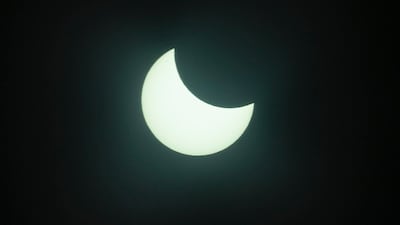A partial solar eclipse will coincide with the final days of Ramadan this year, with people in some parts of the world able to witness the striking celestial event.
While Europe, the Americas and northern Asia will see the Moon partially obscure the Sun on March 29, the phenomenon will not be visible in the UAE. Despite the timing of the event, astronomers said it would have no effect on when Ramadan ends, with the sighting of the crescent moon marking the start of the Islamic month of Shawwal and Eid Al Fitr.
Ramadan is expected to begin on February 28 or March 1 this year. Islamic months last either 29 or 30 days, depending on the sighting of the crescent moon. Solar eclipse, meanwhile, can only occur during the new moon phase. A partial solar eclipse takes place when the Moon comes between the Sun and the Earth.
"The partial solar eclipse does not impact the end of Ramadan. Ramadan ends with the sighting of the crescent moon, which is determined independently of solar eclipses," Khadijah Ahmad, operations manager at the Dubai Astronomy Group, told The National.










"There's no way we will be able to see the Eid crescent on the 29th [of March] because one of the rules of moon sighting is that the moon needs to remain above the horizon after sunset for no less than half an hour before setting and the distance between the Sun and the Moon at that time should be no less than seven degrees."
On March 29, the Sun will set at 6.33pm UAE time and the Moon will set at 6.39pm, Ms Ahmad said. Last year, the sighting of the Shawwal crescent moon coincided with a solar eclipse on April 8. Eid is expected to begin on March 30 or 31.
Al Sadeem Astronomy in Abu Dhabi provided insight into the eclipse’s path, noting it would be visible across Europe, northern Asia, north-west Africa, much of North America, the Atlantic and the Arctic.
"In Europe, including countries such as Spain, Portugal, France, the UK and Germany, will experience the eclipse," the observatory told The National. "In North America, parts of Canada and the north-eastern United States, including Maine, will witness it, too."
About 814 million people are expected to see the celestial event and are advised to use solar eclipse glasses and solar filters, according to Timeanddate.com.
What is Ramadan?
Ramadan is the ninth and most holy month of the Hijri calendar. It is the month the Quran was revealed to the Prophet Mohammed. Muslims do not eat or drink between fajr and maghrib prayers during the holy month.
For Muslims, Ramadan is not simply about abstaining from food, it is also a time with people strengthen their faith by reciting the Quran recitation and praying.
The Islamic calendar is decided by phases of the moon, which are either 29 or 30 days long. The presence of a new moon signals the start of a new month in the Islamic calendar. The committee will begin searching for the new crescent moon after maghrib prayers on the 29th day of Shaban, the month that precedes Ramadan.
If the new moon cannot be seen, or is known, by using calculations, not to be in the sky, it is considered to be the 30th day of the month. But if the new crescent moon is seen, Ramadan begins the following day.


